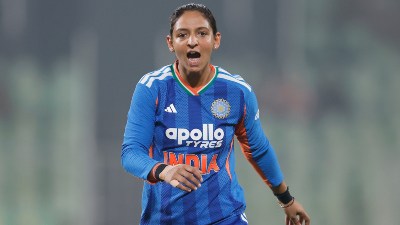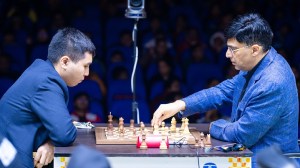Journalism on the cheap
Is the media accountable? This anguished question of Chief Justice V.N. Khare should not go unnoticed now that the media is preoccupied with...

Is the media accountable? This anguished question of Chief Justice V.N. Khare should not go unnoticed now that the media is preoccupied with the US-Iraq war. The chief justice of India is disturbed because no media person has come forward to substantiate the story linking three Karnataka High Court judges to the 8216;Mysore sex scandal8217;.
The chief justice has assured the reporters concerned that the court has no intention to launch a witch hunt but only wants to know the facts. But there has been no response.
It would not be proper to go into the case because it is sub judice. Still the question the chief justice has posed about the accountability of the media is valid and it must be asked. Those who report should be able to stand by what they write. If they cannot, they defame the profession. Mere hearsay, without any corroboration, cannot be put into a news report. Hearsay cannot masquerade as fact.
These are the fundamental principles every media hand must know. But is that all? The debate would have been constructive if the report by the judges8217; committee on the 8216;8216;scandal8217;8217; had been made public.
The committee reportedly found the news reports 8216;8216;baseless8217;8217;. This is not to suggest that the culpability of the media is lessened by the non-publication of the report. But it is only right to demand that all the cards must be placed on the table.
Chief Justice Khare is the first supreme court judge to promise a full debate between the judges and the media on contempt and related matters. This opportunity must be seized.
Many among us are unhappy with what is happening in the media. Tittle-tattle has come to be treated as news. A cheap populism is hawked in the name of modern journalism. Take television, for instance. Two or three media-savvy politicians from different parties are regularly invited to the studio where the anchor invites them to comment on a sensitive subject on the spur of the moment. The more irresponsible their remarks, the better. TV networks are concerned about their ratings, not the effect on the viewers.
Newspapers may be a little more cautious because they come out in black and white. But the old dictum that the news columns are sacred is being increasingly replaced by what is called 8216;investigative reporting8217;, which by and large means reporting with a slant. One is likely to read the editorials in the news columns and vice-versa.
The print media can at least be arraigned before the Press Council of India but not the electronic media. I have argued in vain for the last 10 years for converting the Press Council into a Media Council. But the government8217;s reply has been that the Convergence Bill will take care of everything. The Bill is yet to get Parliament8217;s approval.
The media has changed in the last decade or so. It has become an industry where only considerations of profit matter; good old professional traditions have gone out of the window. The species called editor is more or less extinct. I am reminded of Hemingway8217;s words in After the Storm: 8216;8216;I don8217;t know who killed him but he is dead all right.8217;8217;
Most editors are at best interior decorators, not architects any more. Their shuttling between upstairs, the seat of management or ownership, and the newsroom downstairs, is taking its toll on the newspapers they run.
But it must be said that the judiciary too has lost its elan over the years. Among the wonders of our national birth, none was more wonderful and astonishing than the way in which the judges of the supreme court performed their duty in the early years. In comparison, some of today8217;s judgments are so outlandish that they leave both lawyers and clients gaping. What went wrong?
The statement by a former chief justice that 20 per cent of the judiciary is corrupt was very disturbing. In its aftermath, one expected some action would be taken by the supreme court. There was none, in spite of the fact that the names of the judges who lack credibility are an open secret in every high court.
Is the judiciary accountable? One chief justice said some time back in the open court that he was under pressure but did not name anyone despite repeated pleas from the public and the press. The case of Justice Ramaswamy, who was sought to be impeached on the grounds of dishonesty but eventually went scot-free brought no credit to the judiciary or the country. At least the judges8217; report on him should have been published. Visiting judges from the states to the capital feel obliged to call on the supreme court judges. Why?
There must be some mechanism for ensuring judicial accountability. A judicial commission, to supervise the appointment, promotion and transfer of judges and with powers to take action against those lacking in integrity, is long overdue.
There has been some talk on the setting up of such a body. It will be a feather in the cap of the BJP-led government if it is able to set up one. The judicial commission should not comprise retired judges alone but eminent public men as well.
When a matter which has sparked off public controversy reaches the stage of judicial commission, it ceases to be procedural or legal.
The biggest drawback of the Press Council is that it is too legalistic in its approach. Its proceedings are like those of a law court. When the Council was constituted the purpose was that journalists would be judged by their own peers. But it has ended up becoming another law court. And why should a judge be its chairman? In fact, a top journalist will prove far more effective in that role.
There is too much law in the settling of our affairs. It gives us the vicarious satisfaction of being judicious. But the matter is seldom solved because we unfailingly get lost in technicalities. True, a court is a court of law. But it is also a court of justice. The question is no longer whether the court is legally right but also whether it is just.
- 01
- 02
- 03
- 04
- 05































